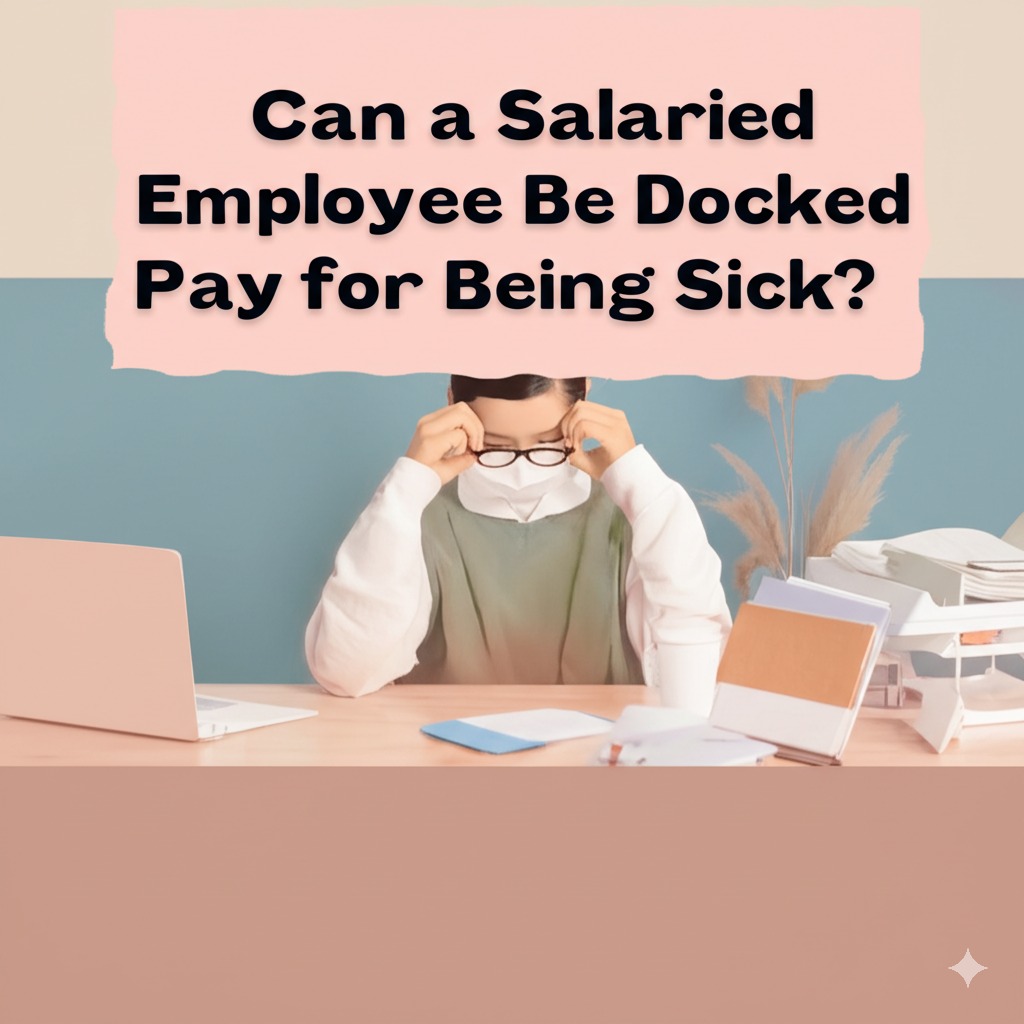
When you’re a salaried employee, you likely expect consistent pay regardless of hours worked. But what happens when you’re sick—can your employer legally dock your pay? The answer isn’t always straightforward. It depends on factors like employment classification, company policies, and federal labor laws.
In this article, we’ll break down whether and when salaried employees can be docked pay for being sick, what protections the law provides, and what your options are if you find yourself in this situation.
Understanding the Basics: What Does “Salaried” Mean?
A salaried employee is typically paid a fixed amount each pay period, regardless of how many hours they work. But it’s important to understand that not all salaried employees are treated the same under the law.
Exempt vs. Non-Exempt Employees
Under the Fair Labor Standards Act (FLSA), employees fall into two main categories:
- Exempt employees: Not entitled to overtime pay and must earn at least $684 per week (as of 2025), meeting specific job duty requirements.
- Non-exempt employees: Eligible for overtime pay and can be paid hourly or by salary.
The rules for docking pay are stricter for exempt employees than for non-exempt ones.
When Can a Salaried Employee’s Pay Be Docked?
While salaried employees are usually guaranteed full pay each period, there are certain legal exceptions where pay deductions are allowed.
1. Unpaid Sick Leave After PTO Is Exhausted
If you’ve used all your paid sick leave or PTO, your employer may legally dock your pay for full-day absences due to illness. This is especially true if your company has a clearly communicated policy.
🔹 Key Point: Partial-day pay deductions are typically not allowed for exempt employees under FLSA rules—only full-day absences may be deducted.
2. FMLA Leave
If you’re eligible for Family and Medical Leave Act (FMLA) coverage and take unpaid leave under this law, your employer is not required to pay you for those days. However, your job and benefits are protected.
3. Probationary or Disciplinary Policies
Some employers have probation or disciplinary policies that may affect pay if absences are excessive or go unreported. These deductions are often contractual and should be detailed in your employee handbook.
When Is It Not Legal to Dock a Salaried Employee’s Pay?
There are clear rules that protect exempt salaried employees from improper deductions:
❌ Partial-Day Deductions
Employers cannot deduct pay for partial-day absences for exempt employees. For example, if you leave work early due to illness, your employer cannot dock your salary for those few hours.
❌ Lack of a Sick Leave Policy Isn’t an Excuse
Even if your company doesn’t offer paid sick leave, it cannot make improper deductions from an exempt employee’s salary without violating FLSA regulations.
❌ Disciplinary Deductions Must Be Lawful
Deductions for discipline (such as suspensions) are only legal under certain conditions and must usually be for violations of workplace conduct rules, not simply for being sick.
How Employers Should Handle Sick Time for Salaried Workers
Best practices for employers include:
- Offering generous paid sick leave or PTO policies.
- Making sure any deductions follow FLSA guidelines.
- Keeping detailed records of absences and applicable deductions.
- Communicating policies clearly in the employee handbook.
For employees, it’s important to understand your rights and review your contract or company policies before assuming any deduction is lawful.
What to Do If Your Pay Was Docked Improperly
If you suspect your employer has made improper pay deductions, here’s what you can do:
- Check your employment classification (exempt vs. non-exempt).
- Review your company’s sick leave and PTO policies.
- Talk to your HR department for clarification.
- File a complaint with the Department of Labor (DOL) if necessary.
- Consult an employment attorney if your issue remains unresolved.
Frequently Asked Questions (FAQs)
Can salaried employees take sick days without pay?
Yes, but only under specific circumstances—such as when all paid leave has been used or during FMLA leave. The deduction must be for full days and align with legal guidelines.
What happens if I’m sick for a partial day?
Exempt salaried employees must be paid their full salary if they work any part of the day. Partial-day deductions are not allowed under federal law.
Can my employer fire me for being sick?
While employers generally cannot fire someone just for being sick, at-will employment laws in many states allow termination for various reasons—though disability protections under the ADA or FMLA may apply.
Final Thoughts: Know Your Rights as a Salaried Employee
While salaried employees often enjoy predictable pay, they aren’t immune from pay deductions—especially when it comes to sick leave policies. However, any pay docking must strictly follow federal and state labor laws.
If you’re unsure whether a deduction is legal, don’t hesitate to ask questions, review your policies, and advocate for your rights.

Andre Cuevas provides career insights, job search strategies, and professional advice to help individuals navigate the job market and achieve their career goals.





